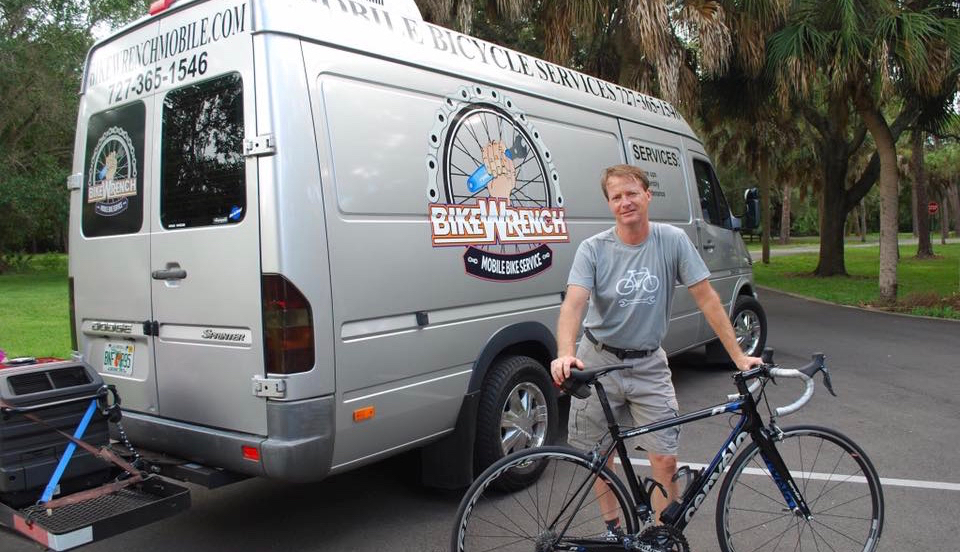PLAISTOW, N.H. (BRAIN) — It’s been less than three years since David Ricker launched his mobile bike repair business in Southern New Hampshire, Pedalin’ Fools. But in that time, Ricker has seen the bike industry become increasingly accepting of businesses like his.

“I understand that in previous history, mobile service providers were hobbyists, but we are all legitimate business people,” said Ricker, referring to the members of the Independent Mobile Bicycle Professionals, which is currently a closed Facebook group but whose members are planning to organize as a trade association soon. The Facebook group has 72 members, who are admitted after showing they are more than hobbyists, with business licenses and insurance.
Before going mobile, Ricker worked at and managed several stores in New England over the course of a nearly 20-year career in the bike industry. But when he launched Pedalin’ Fools, he found that independent mobile operators are in a no man’s land of sorts: they are competing with franchise mobile operations, but they aren’t considered IBDs, either.
“I was looking at places like The Bike Coop and the NBDA, and none of these entities would even consider talking to a mobile service provider,” Ricker told BRAIN this week.
“I’d guess every one of us looked into Velofix and Beeline before deciding to remain independent.” — John Johnson
Now, wholesalers have seen the growth of independent mobile service providers, as well as franchise operations like Velofix and Beeline. Most distributors are now willing to open accounts with legitimate mobile shops, although mobile-only businesses still can’t join the National Bicycle Dealers Association as dealer members.
The Facebook group has members from across the U.S., as well as Canada, South America, Australia and the U.K. It formed about three years ago as a way for a few acquaintances to share tips about mobile bike businesses, said Geoff Leonard, owner of Saving Time Bike Repairin Birmingham, Alabama. Leonard said the group started as an online conversation between himself and an industry acquaintance who was launching a mobile business in Seattle. The conversation expanded and the closed group was formed.
At first, group members weren’t vetted and it quickly grew to more than 200 members, some of whom were hobbyists or just curious.
“It got out of hand, actually,” Leonard said. “So I deleted everyone and started over. Now we require all members to have a business license and a FEIN number and business insurance,” he said.
Members share tips on suppliers who are willing to work with mobile businesses, tech and service tips, and ideas on how to modify and run a service van, including a fair amount of Sprinter van porn. “People do like to show off their Sprinters,” Leonard said.
Leonard hasn’t gone the Sprinter route, running his business with a Ford Ranger that can carry six bikes. He does some repairs on site but brings more complicated jobs back to his workshop, acting more like a shop with pickup and delivery service. (He was thrilled that he was able to register the pickupmybike.com domain for his business.) Leonard worked in bike retail for 17½ years before starting his mobile business. He managed stores, operated event sag support and race support, and is trained in bike fitting as well as technical service.
In part, the IMBP group has grown because it allows independent mobile operators to share information the way Velofix and Beeline franchisees do, said John Johnson, a group member and owner of Bike Wrench, a mobile business based in Pinellas Park, Florida.
“We’d like to have some of the benefits (the franchise businesses) have, without the franchise fee,” Johnson said. “I’d guess every one of us looked into Velofix and Beeline before deciding to remain independent.”
Johnson, who has been in the bike industry since 1998, said that when he launched his mobile business in 2016 he encountered a few suppliers who refused to sell to him. Now he buys from distributors including QBP, KHS and J&B, as well as some high-end road suppliers.
“We had people not willing to work with us, a year and a half or two years ago. But after they have five or 10 (mobile businesses) call them, they change their minds,” he said. “I have everything any business has, including a 1,000-square-foot storage unit.”
Currently the IMBP Facebook group has a backlog of about 30 prospective members who have yet to be vetted. Johnson estimated that there are at least 150 independent mobile bike businesses in the U.S., in addition to about 150 mobile franchises and an unknown number of established brick-and-mortar retailers who also offer mobile service.
As the group gets more formal, either as a nonprofit trade association or a co-op, it would be able to present a unified front that suppliers could partner with, members said. For example, brands setting up online bike sales would be able to reach a group of qualified bike assemblers through the group, Johnson said.
Velotooler, which offers a peer-to-peer online platform that connects independent mechanics to consumers, is already developing a relationship with the group. The connection gives Velotooler access to a vetted group of established mechanics nationally and the mobile business members benefit from access to Velotooler’s software tools and marketing.
While the Facebook group has no formal leader, Ricker is taking the lead in pushing for the group to take the next step in getting organized formally. He said he expects the group to make that leap in the next few months, although he’s not sure if it will organize as a nonprofit trade association or as a co-op. The co-op model would allow the group to negotiate volume buys with suppliers and insurance providers, for example. It also could sell members mobile-specific equipment like trailers, he said.

